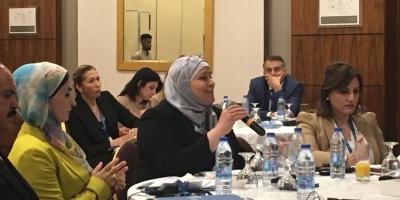
Lack of legal awareness, insufficient access to lawyers and justice mechanisms perceived as ineffective or unaffordable are among the obstacles most commonly experienced by women entrepreneurs in Jordan when attempting to access justice, according to the findings of a baseline assessment presented yesterday in Amman by the European Bank for Reconstruction and Development (EBRD) and IDLO in cooperation with the Center for Women’s Studies at the University of Jordan.
The research found that a number of legal, economic, practical and social barriers prevent women entrepreneurs from resolving disputes affecting their businesses. Overall, when trying to start and operate their own business, legal obstacles faced by women can be compounded by high costs and lack of access to financial support, as well as social barriers to conducting business as a woman – including resolving disputes.
Speaking at the national workshop where the findings were shared, Michel Nussbaumer, Director of Legal Transition at EBRD, explained: “The EBRD aims to improve the business environment for women entrepreneurs in the countries where it invests; we want to raise awareness of their rights, but also identify measures to address the existing gaps. Such actions are so important when you want to create sustainable market economies.”
“While the level of women’s participation in the economy in Jordan is low, entrepreneurship among women is gaining popularity,” said Nancy Fashho, IDLO’s Senior Program Coordinator for the Middle East and North Africa region. “The Jordanian government has made progress in creating an environment that is conducive to the success of women entrepreneurs. These research findings can inform further steps to help improve the business environment in general, and support women entrepreneurs in particular - including through strengthened access to justice.”
The baseline assessment was undertaken in early 2018 with a view towards identifying areas where capacity enhancement, future programming, and advocacy are needed to facilitate access to justice for women entrepreneurs.
Findings and proposed recommendations were discussed and validated by national stakeholders at the workshop, including representatives from Jordanian ministries and public institutions, business associations, NGOs, the private sector and entrepreneurs.
According to Dr. Abeer Dababneh, Director of the Centre for Women’s Studies, “there is a necessity to better understand what barriers women entrepreneurs face in accessing justice and develop an action plan to address them”.
The assessment and workshop were conducted as part of an EBRD-IDLO project aimed at helping create an enabling environment for women entrepreneurs in Jordan.

